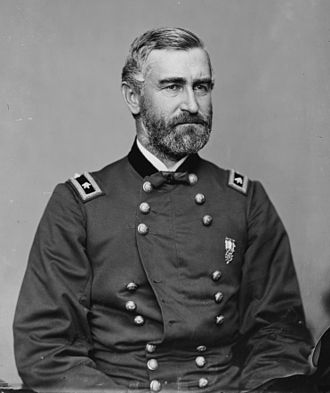Discover Your Roots
SIGN UPDiscover Your Roots
SIGN UPThe name Gershom is of Hebrew origin and is primarily associated with males. It means "Stranger," reflecting the biblical story of Gershom, the firstborn son of Moses and Zipporah. The name signifies "a sojourner there," alluding to Moses' flight from Egypt. Gershom's lineage has connections to the priesthood, with discussions about the possibility of non-Aaronim, including descendants of Moses, serving as priests. However, the biblical account emphasizes the appointment of Aaron and his direct sons for priestly duties. Despite his lineage, Gershom didn't play a prominent role in the priesthood, as God instructed Moses to pass authority to Joshua instead of his sons. This historical and biblical significance adds depth to the name Gershom, portraying a sense of outsider status and unique ancestral connections.

Gershom Mott (April 7, 1822 – November 29, 1884) was a distinguished United States Army officer and General in the Union Army during the American Civil War. Born in Lamberton, New Jersey, he was the grandson of American Revolutionary War Captain John Mott. Mott's early education took place at the Trenton Academy, now known as the Trenton Public Library.During the Civil War, Mott played a significant role as the lieutenant colonel of the 5th New Jersey Infantry Regiment and later as the colonel and commander of the 6th New Jersey Volunteer Infantry. His bravery and leadership were evident in battles such as Seven Pines, Second Battle of Bull Run, and the Battle of Chancellorsville.In 1864, Mott assumed command of the 4th Division of the II Corps, demonstrating his resilience and dedication despite facing challenges and criticism, and played an instrumental role during the Siege of Petersburg and the Appomattox Campaign.Post-war, Mott served in various government positions in New Jersey, leaving a lasting legacy that led to the naming of the Gershom Mott Elementary School and Fort Mott in his honor.Gershom Mott's commitment, bravery, and contributions to New Jersey and the nation continue to be remembered and honored.

Gershom Carmichael (1672–1729) was a notable Scottish philosopher who overcame physical challenges to make significant contributions to the field of philosophy. Born in London to a father banished by the Scottish privy council for his religious beliefs, Carmichael endured childhood struggles with crooked limbs, which were eventually corrected through treatment in Bath. Despite these obstacles, he excelled academically, graduating from Edinburgh University and later becoming a regent at St Andrews. His career led him to the University of Glasgow, where he was elected a master and later became the professor of moral philosophy. Carmichael's work, including the treatise on logic and intellectual powers, the Synopsis Theologiae Naturalis, and his influential edition of Pufendorf's De Officio Hominis et Civis, solidified his place as a key figure in the Scottish school of philosophy. His legacy lives on through the writings of his son, Frederick, who authored notable sermons. Gershom Carmichael's enduring impact on philosophy and academia continues to be recognized and celebrated.

Gershom Cox (28 September 1863 – October–December 1918) was a prominent English professional footballer who is best known for his significant contribution to the sport during the late 19th century. Cox began his career with Birmingham Excelsior in 1886 before moving on to play for Walsall Town and eventually signing with Aston Villa in 1887. One of his notable achievements was scoring the first goal in The Football League during its inaugural season in 1888-89. Although the goal was an own goal, it earned him a place in football history. Cox's career at Aston Villa saw him make 101 first-team appearances, with 86 in the Football League. After departing from Aston Villa, he continued his football journey with other clubs before retiring in 1900 due to a leg injury. Following his retirement, Cox pursued a successful career as a market trader and later worked as a coach for Kent League club Gravesend United. His notable achievements include winning an FA Cup runners-up medal with Aston Villa in 1892. Gershom Cox's legacy lives on as a significant figure in the early history of English football.


All images displayed on this page are sourced from Wikipedia or Wikimedia Commons.We use these images under their respective Creative Commons or public domain licenses. Wherever applicable, author attributions and license information are provided. If you believe an image is used incorrectly or outside its license terms, please contact us so that we can review and correct the issue.